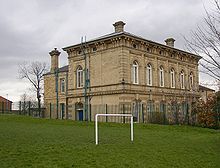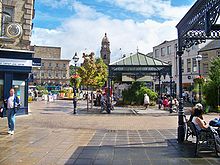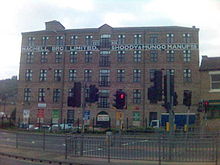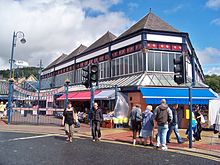- Dewsbury
-
For the constituency of this name, see Dewsbury (UK Parliament constituency).For other uses, see Dewsbury (disambiguation).
Coordinates: 53°41′28″N 1°37′59″W / 53.691°N 1.633°W
Dewsbury 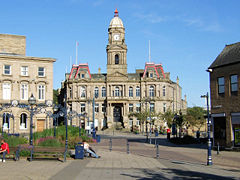
Dewsbury Town Hall
 Dewsbury shown within West Yorkshire
Dewsbury shown within West YorkshirePopulation 54,341 (2001 Census) OS grid reference SE245225 Metropolitan borough Kirklees Metropolitan county West Yorkshire Region Yorkshire and the Humber Country England Sovereign state United Kingdom Post town DEWSBURY Postcode district WF12-13 Dialling code 01924 Police West Yorkshire Fire West Yorkshire Ambulance Yorkshire EU Parliament Yorkshire and the Humber UK Parliament Dewsbury List of places: UK • England • Yorkshire Dewsbury (/ˈdjuːzbəri/[1]) is a minster town in the Metropolitan Borough of Kirklees, in West Yorkshire, England. It is to the west of Wakefield, east of Huddersfield and south of Leeds. It lies by the River Calder and an arm of the Calder and Hebble Navigation.
Historically a part of the West Riding of Yorkshire, after undergoing a period of major growth in the 19th century as a mill town, Dewsbury went through a period of decline. More recently there has been redevelopment of derelict mills into flats, and regenerating of run-down areas.
According to the 2001 census the Dewsbury urban sub-area had a population of 54,341. Dewsbury is the largest town in the Heavy Woollen District, a conurbation of small mill towns.
Contents
History
Toponymy
The Domesday Book of 1086 records the name as Deusberia and Deusberie. It is believed to mean "fortified place by a stream", from Old English deaw "dew" (stream) and burg "fort". Other suggestions include the Burg of David, from the old pre-Norman-Conquest British Gaelic for David, being Deu, similar to the Welsh form, Dai. There are other theories on the name's origins such as a Mercian name, after the founder of a fortified settlement, named Dui, Dew or Deus--"beria" meaning fort or stronghold. # "God's Hill", from the old British word "Duw", meaning God (cf Latin "Deus"), and "burg", meaning a hill [2] [3] or "Tiu's Hill", derived from the Germanic god Tiu from the same Indo-European origin.
Early history
In Saxon times, Dewsbury was a centre of considerable importance. The ecclesiastical parish of Dewsbury encompassed Huddersfield, Mirfield and Bradford. Ancient legend records that in 627 Paulinus, the first Bishop of York, preached here on the banks of the River Calder. Numerous Saxon graves have been found in Dewsbury and Thornhill. [2]
Dewsbury Minster lies near the River Calder, traditionally on the site where Paulinus preached. Parts of the church date to the 13th century. The tower houses "Black Tom", a bell which is rung each Christmas Eve, one toll for each year since Christ's birth, known as the "Devil's Knell", a tradition dating back to the 15th century. The bell was donated by Sir Thomas de Soothill, in penance for murdering a servant boy in a fit of rage. The tradition was commemorated on a Royal Mail postage stamp in 1986. [4]
Dewsbury market was established in the 14th century for local clothiers. Occurrences of the plague in 1593 and 1603 closed the market and it reopened in 1741.
Throughout the Middle Ages Dewsbury retained a measure of importance in ecclesiastical terms, collecting tithes from as far away as Halifax in the mid-14th century. John Wesley visited the area five times in the mid-18th century, and the first Methodist Society was established in 1746. Centenary Chapel on Daisy Hill commemorates the centenary of this event, and the Methodist tradition remained strong in the town. [5]
Industrial Revolution
In 1770, a short branch of the Calder and Hebble Navigation was completed, linking Dewsbury to the main canal system and giving access to Manchester and Hull. By the time of the Industrial Revolution, Dewsbury was a centre for the "shoddy" and "mungo" industries which recycled woollen items by mixing them with new wool and making heavy blankets and uniforms. The town benefited economically from the canal, it's location at the heart of the Heavy Woollen District, and its proximity to nearby coal mines. The railway arrived in 1848 when Dewsbury Wellington Road railway station on the London and North Western Railway opened; this is the only station which remains open. Other stations were Dewsbury Central on the Great Northern Railway which closed in 1964 and Dewsbury Market Place on the Lancashire and Yorkshire Railway which closed in 1930; a fourth goods-only station was built in the early 20th century at Savile Town by the Midland Railway. In 1985 a bypass road was built on the site of Central Station and its adjacent viaduct, and nothing remains of Market Place Station. The 19th century saw a great increase in population, rising from 4,566 in 1801 to around 30,000 by 1890.
The town’s rapid expansion and commitment to industrialisation was not without problems, resulting in social instability. In the early 19th century Dewsbury was a centre of Luddite opposition to mechanisation in which workers retaliated against millowners who installed new textile machinery and smashed the machines which threatened their way of life. In the 1830s Dewsbury was a centre of Chartist agitation. In August 1838, after a speech by Chartist leader Feargus O'Connor, a mob of between five and seven thousand people besieged the Dewsbury Poor Law Guardians in the town’s Royal Hotel. The mob was dispersed by troops. Trouble flared in 1840 when radical agitators seized control of the town, and troops were stationed to maintain order. This radical tradition left a legacy in the town's political life, its first elected MP in 1867 was John Simon, a Jewish lawyer from Jamaica and a Liberal.
The mills were often family businesses and continued manufacturing after the wool crisis in 1950-51, which saw Australian sheep farmers begin to charge higher prices. However, the recovery of the late 1960s was reversed by the 1973 oil crisis, and the textile industry in Dewsbury declined, with only bed manufacturing remaining a large scale employer.
Recent history
Peter Sutcliffe, the Yorkshire Ripper, was questioned at Dewsbury Police Station and charged before magistrates in the courtroom of Dewsbury Town Hall after his arrest in January 1981.
After 2005 Dewsbury was labelled a troubled town after a series of negative press reports[3] and became "the town that dare not speak its name"[4] after high profile crimes brought it into the media spotlight. In June, a girl of 12 was charged with grievous bodily harm after attempting to hang a five year old boy from Chickenley.[5] Mohammad Sidique Khan, ringleader of the group responsible for the 7 July 2005 London bombings lived in Lees Holm, Dewsbury. On 19 February 2008, Shannon Matthews, aged nine, disappeared in Dewsbury Moor. Shannon was found hidden in the base of a divan bed in Batley Carr on 14 March 2008 and Michael Donovan, aged 39, was arrested. The hunt was the largest police search since that for the Yorkshire Ripper 30 years earlier. Donovan was the cousin of Craig Meehan, Shannon's step-father. Her mother Karen Matthews and Donovan were jailed for eight years for abduction and false imprisonment.
The local community radio station is Branch FM, which has operated since 2007 on the 101.8FM frequency in the Dewsbury district.
In October 2010 the Dewsbury Revival Centre opened, based the refurbished former St. Mark's Church on Halifax Road, Dewsbury. This was the church attended by the Titanic bandmaster, Wallace Hartley.
Governance
Dewsbury was incorporated as a municipal borough in 1862 [6], its first mayor was Dr George Fearnley. The 1868 Reform Act constituted Dewsbury a parliamentary borough, its first MP being Mr Sergeant Simon. The Victorian town hall standing in front of the old marketplace was built in 1886-89. Dewsbury's boundaries were expanded to include the urban districts of Ravensthorpe, Thornhill, Soothill Nether and half of Soothill Upper[citation needed] in 1910 and it was elevated to county borough status in 1913. "Soothill Nether" refers to the current east end of the town, although, at the time, Chickenley and Chidswell were hamlets, and Earlsheaton formed the bulk of the area's population. The covered market was opened in 1904 and during the 1920s trade moved from the original market place to the area around the covered market.
In 1974 responsibility for local government passed to Kirklees Metropolitan Council, with its headquarters in Huddersfield. The population of Dewsbury has remained broadly static over the past century - the 1911 census recorded 53,351 people [7], and the 1971 census 51,326 people, making it the fourth least populous county borough in England (after Canterbury, Burton and Yarmouth).
Geography
Dewsbury is situated between a number of larger towns and cities. Leeds and Bradford lie eight miles to the north, Huddersfield a similar distance to the south west, and Wakefield some six miles east. In recent years its proximity to these major urban centres, the M1 and M62 motorways and its position on the Huddersfield Line, served by the TransPennine Express, have contributed to its rising popularity as a commuter town.
Dewsbury is part of the West Yorkshire Urban Area, and the natural boundaries of the town are not well defined, with built up areas of the town running into neighbouring Batley, Heckmondwike and Ossett.
Geologically, the town is situated on rock dated to the Carboniferous Period, consisting of coal measures and gritstones. Quaternary Period rock, glacial deposits and gravels exist in the Calder Valley. Coal, stone and gravel have all been exploited commercially. Average rainfall is 100 cm per annum.[8]
The town is dominated by hills, notably Earlsheaton, Dewsbury Moor, Staincliffe and Thornhill. The town centre is at 40 m-55 m above sea level, rising to 110 m at Earlsheaton and Batley Carr, and 230 m at Grange Moor. The approach down from Earlsheaton through the Wakefield Road cutting, constructed in 1830, is dramatic with the view of the town centre nestling in the Calder Valley opening up as you descend.
The majority of the older buildings were built in Yorkshire stone, many of which have recently been restored by sandblasting. Notable structures include the railway viaduct, and Machell's Shoddy and Mungo Mill, converted into apartments but still bearing the famous slogan of its original occupants.
Divisions and suburbs
Dewsbury has a number of different districts with very different geographical and socio-economic patterns. Some of the districts of Dewsbury are, Chickenley, Crackenedge, Dewsbury Moor, Thornhill, Earlsheaton, Eastborough, Eightlands, Flatts, Ravensthorpe, Savile Town, Shaw Cross, Scout Hill, Thornhill Lees, Westborough, Westtown. Batley Carr, Hanging Heaton and Staincliffe have areas which lie in both Dewsbury and neighbouring Batley. Thornhill is classified as part of Dewsbury. It was annexed by the town's council in 1910, along with Briestfield and Whitley.

Heckmondwike Batley 

Ossett  Dewsbury
Dewsbury 

Mirfield Flockton Demographics and economy
From the outset of the industrialisation of the town with its many mills, a large influx of Irish workers arrived in the town, settling in the Westtown area. This area has the large and imposing Our Lady and St. Paulinus Roman Catholic Church and its school, once run by the nuns of the area. The Irish National Club also is home to Dewsbury Celtic amateur rugby league club, with its many age groups of players. Starting in the late 1950s and continuing until the 1970s, many families from South Asia, particularly Pakistan, settled in Dewsbury. By 1966 around 2,000 immigrants from Commonwealth countries had made Dewsbury their home. Many worked in the woollen mills, making good the labour shortage in that sector.
The town has a large Asian community. Savile Town and Ravensthorpe are populated mainly by Muslims of Indian and Pakistani origin. In recent years, there has also been an immigration of Iraqi Kurds and Hungarians into the town.[6] Dewsbury is known for having a Shariah arbitration court, which has caused some controversy.[7] The Dewsbury Moor, Ravensthorpe and Chickenley areas are classed among the 10% most deprived areas in the UK [9]. In contrast to some British towns and cities, the east side of the town is generally more affluent. The majority of houses in the town are in the cheapest band for council tax, for house prices are amongst the lowest in the country.[10]
The town centre is starting to see a something of a revival, with large retailers such as Sainsbury's, Next and Matalan it also has many other stores. The local market comprising 400 stalls is one of the busiest in Yorkshire and today draws coach-loads of visitors to the town; in April 2007, Dewsbury Market won the award as "Britain's Best Market". Wednesdays and Saturdays are the normal market days with the popular flea market on Fridays. Just south of the River Calder in the town centre was where the mills of the town were traditionally located. As the mills closed, this area became a large brownfield site. However, many of the units have now been reoccupied and the town's largest employer, Carlton Cards is based in this area. A large shopping centre, planned to occupy a large area of the town centre has as many supporters as detractors.
Sport
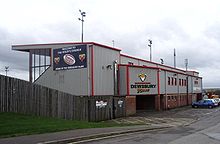 The Tetley's Stadium
The Tetley's Stadium
Dewsbury RLFC play in the Co-op Championship. They play at the Tetley's Stadium, on Owl Lane, towards Ossett, on the site of the old Savile & Shaw Cross Colliery. Their original and famous ground Crown Flatt stood on Leeds Road, at Earlsheaton, for many years until it was burned down, by arsonists in the late 1980s. It has been replaced with a modern housing estate. Dewsbury are where one of the first rugby league sides to have their own TV website www.dewsburyramstv.co.uk. Dewsbury Celtic play in National League 3, their ground is on the west side of the town, in Crow Nest Park. The club's headquarters are at the Dewsbury Irish National Club on Park Parade. Also the home of the Dewsbury Rangers Football club, with over 300 members from the ages of six through to the old boys teams it is one of the largest in the area and new members always welcome, And thanks to the hard work of the committee and all involved with the club and local community the club is due to have a purpose built clubhouse on the Wakefield Road Playing Fields about 1 mile from the town centre of Dewsbury.
Culture
Dewsbury Museum is located within the mansion house in Crow Nest Park. After an extensive 18 month programme of building and gallery refurbishment the museum reopened in the summer of 2010. Nearby attractions include the National Coal Mining Museum for England.
In 2009 Dewsbury hosted Kirklees Council's Concerts in the Park and over 8,000 came to watch pop stars McFly, Ironik and the Yeah You's play a free concert.
The town also has an annual event called Spirit, a street theatre show every winter which takes place in the town centre.
Education
Dewsbury had two grammar schools – The Wheelwright Grammar School for Boys and, further up the hill, the Wheelwright Grammar School for Girls. The 1970s education reforms downgraded these two establishments to high schools. One is now used by Dewsbury College, the other by Birkdale High School a notably improving school. In the 2005 School League Tables, Dewsbury's Eastborough Junior, Infants and Nursery schools were reported to have the most consistently improved results over the past four years. However, the headteacher of the school, Nicola Roth, has been highly critical of School League Tables in the UK and has been reported to have said "It would be better if league tables did not exist".[8]
Batley College of Art and Design, which is part of Dewsbury College, has a strong reputation for print and textile-based art work.
Notable people
- The actor Patrick Stewart was born in nearby Mirfield. He worked for a very brief period as a journalist for the town's local Dewsbury Reporter[11][dead link] and appeared on 4 April 2003 in Dewsbury Town Hall to raise money for charity.
- Gemma Nelson, painter
- The Reverend Patrick Brontë, the father of Anne Brontë, Charlotte Brontë and Emily Brontë, was rector of the parish church from 1809 to 1811. In Charlotte Brontë's Shirley, Dewsbury features as "Whinbury".
- John Rudd, the Tudor cartographer, was Vicar of Dewsbury and Rector of Thornhill. His apprentice in map making was Christopher Saxton, who lived with Rudd in Dewsbury as his servant while a young man, and went on to complete the mapping of England.
- James Levitt Was a junior architect who assisted Isambard Kingdom Brunel in designing the Clifton Suspension Bridge in 1831, he was born in Dewsbury.
- John Michell, the 18th century scientist known for his pioneering work on magnetism, geology, and astronomy, especially his early postulation of the possibility of black holes, was Rector of Thornhill from 1767 until his death in 1793.
- Dewsbury was also the birth place of actors Frank Crawshaw, Valentine Pelka, Kazia Pelka, Mary Tamm, Rebecca Callard.
- Tom Kilburn, a computer engineer and the co-inventor of the first stored-program computer, and Thomas Clifford Allbutt, inventor of the clinical thermometer, were both born in Dewsbury.
- Sir Owen Willans Richardson, physicist, professor and Nobel Prize winner was born in Dewsbury.
- Larry Hirst CBE, Chief Executive of IBM UK.
- Wallace Hartley, bandmaster on the RMS Titanic when it sank in 1912, called Dewsbury his home at the time of his death. A blue plaque marks the house on West Park Street in which he lived.
- Franz Ferdinand bassist, Bob Hardy, was born in Dewsbury but grew up in Bradford.
- Leeds Rhinos and Great Britain rugby league player Matt Diskin was born in Dewsbury and played for Dewsbury Moor ARLFC before becoming a professional player.
- Former rugby league player and Sky Sports commentator Mike Stephenson was born in the town and captained Dewsbury to their only championship success in 1973.
- The voice of rugby league, commentator Eddie Waring was also born in Dewsbury. Waring became a commentator after a successful career as the manager of Dewsbury Rugby League Football Club, winning both the Challenge Cup and championship. He went on to become a household name, famed for his sporting commentaries and work on the BBC programme It's a Knockout.
- Former Leeds Rhinos, England and Great Britain rugby league player Francis Cummins was also born in Dewsbury.
- Former Speaker of the House of Commons (Parliament), Baroness Betty Boothroyd.
- Controversial writer Tim Fountain and Andrew Morton, the biographer of Diana, Princess of Wales, were also born in Dewsbury.
- Betty Lockwood, Baroness Lockwood of Dewsbury, was born in the town in 1924 and attended Eastborough Girls' School. She went on to become the first Chair of the Equal Opportunities Commission and later Chancellor of the University of Bradford.
- Leeds United footballer, Leigh Bromby was born in Dewsbury, as was Neil Redfearn
- Former WBF World, European and Commonwealth Welterweight boxing champion James Hare was born in Dewsbury.
- Greg Rusedski was able to play tennis for Great Britain because his mother was born in Dewsbury.
- Vic Metcalfe, the Huddersfield Town and England right winger, was born in Ravensthorpe.
- Jon Worthington, footballer, now of Oldham Athletic formerly of Huddersfield Town
- Eileen Fenton first lady swimmer to complete the Daily Mail International Cross Channel race 1950.[9]
- Joel Graham bass player of Thrash Metal band Evile was born and lives in Dewsbury.
- Current and former members of My Dying Bride.
- Yorkshire Cricket captain Andrew Gale and players Richard Pyrah and Gary Ramsden were born in Dewsbury.
- Gary Brook played for Blackpool and Scarborough football team.
- Gary Sykes, the reigning British super-featherweight boxing champion is a resident of Dewsbury Moor
- Karen Matthews, sentenced to eight years in prison for kidnapping and imprisoning her daughter, Shannon Matthews.
- South African football referee Daniel Bennett was born in Dewsbury.
References in popular culture
Dewsbury is referenced in the Beatles' 1967 film Magical Mystery Tour. A line of dialogue in the film has one of the magicians (all portrayed by the Beatles themselves) - who are keeping an eye on the whereabouts of the bus that is taking its passengers on the journey of the film's title - exclaim: "The bus is ten miles north on the Dewsbury road and they're having a lovely time!" [12] Dewsbury is also referenced in the 1991 single "It's Grim Up North" by the Justified Ancients of Mu Mu (also known as The KLF).
The 1960 book A Kind of Loving is set in a fictional city named "Cressley", but its description was based upon Dewsbury. The author, Stan Barstow, was born in Horbury and grew up in Ossett - both of which are just to the east of Dewsbury.
More recently, the phrase "Dewsbury noir" has been used to describe the violent novels of David Peace, who was born in Dewsbury but lives in neighbouring Ossett.[10]
References
- ^ Oxford B.B.C. Guide to Pronunciation, Oxford, 2006, page 99
- ^ http://www.huddersfield1.co.uk/huddersfield/tolson/angles_danes/anglian_abbeys.htm
- ^ Wainwright, Martin (29 May 2008). "The name's Dewsbury". The Guardian (London). http://www.guardian.co.uk/commentisfree/2008/may/29/communities.pressandpublishing. Retrieved 2009-06-04.
- ^ Norfolk, Andrew (28 May 2008). "Dewsbury: Kidnap, lynching and a suicide". The Times (London). http://www.timesonline.co.uk/tol/news/uk/crime/article4016574.ece. Retrieved 2009-06-04.
- ^ "Hanging case girl spared custody". BBC News Online (BBC). 3 October 2005. http://news.bbc.co.uk/1/hi/england/bradford/4305188.stm. Retrieved 2009-06-04.
- ^ Hungarians referred to in these articles http://www.thepressnewspaper.co.uk/NewsDetails.asp?id=1169 http://news.bbc.co.uk/1/hi/england/bradford/7261208.stm Kurds referred to in this article http://www.dewsburyreporter.co.uk/news?articleid=2737475
- ^ http://www.dewsburyreporter.co.uk/news/Muslims-accused-of-running-Islamic.2852441.jp
- ^ "The best and worst results". BBC News. 19 December 2005. http://news.bbc.co.uk/1/hi/education/4489858.stm. Retrieved 27 March 2010.
- ^ [1]
- ^ http://www.guardian.co.uk/books/2009/feb/22/fiction-david-peace-the-damned-utd See also the article "Riding high with his Ripper yarns" from The Sunday Times, Sunday 1 March 2009, page 19
External links
- Local Newspaper "The Press"
- Area profile and statistics
- Batley & Dewsbury Towns' Management Association
- Visitors to Dewsbury Page
- Dewsbury Museum
- The registers of Dewbury, Yorkshire (1538-1653)
Ceremonial county of West Yorkshire Metropolitan districts Major settlements - Batley
- Bingley
- Bradford
- Brighouse
- Castleford
- Cleckheaton
- Denholme
- Dewsbury
- Elland
- Farsley
- Featherstone
- Garforth
- Guiseley
- Halifax
- Hebden Bridge
- Hebden Royd
- Heckmondwike
- Hemsworth
- Holmfirth
- Horsforth
- Huddersfield
- Ilkley
- Keighley
- Knottingley
- Leeds
- Meltham
- Mirfield
- Morley
- Mytholmroyd
- Normanton
- Ossett
- Otley
- Pontefract
- Pudsey
- Rothwell
- Shipley
- Silsden
- South Elmsall
- Sowerby Bridge
- Todmorden
- Wakefield
- Warley Town
- Wetherby
- Yeadon
See also: List of civil parishes in West Yorkshire
Topics - Parliamentary constituencies
- West Yorkshire Joint Services
- Monastic houses
- Museums
- Windmills
Categories:- Dewsbury
- Market towns in West Yorkshire
- Heavy Woollen District
- Geography of Dewsbury
- Kirklees
- Towns in West Yorkshire
Wikimedia Foundation. 2010.



